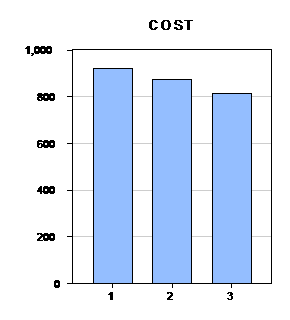The Senate has closed debate on its bill. What have “moderates” wrought? Figures 1 and 2 depict the fiscal impulse arising from Senate and House bills, respectively.
Yearly Archives: 2009
Kash Mansori on a home purchase tax credit
We’re pleased today to feature a guest contribution to Econbrowser from Kash Mansori, senior economist for Jefferson Wells International.
The paradox of thrift
Or, how come you used to say that if consumers don’t save more, it will wreck the economy, and now you say, if consumers do save more, it will wreck the economy?
What Are These Three Numbers?
Here is a bar chart of three figures. What are they?

Figure 1: Costs, in billions of dollars.
The Employment Situation in January
Looks pretty bad to me — especially after taking into account downward revisions for December. Not too good on the output side either.
Why Can’t We All Just Get Along? The Great Multiplier Debate
I’ve been thinking about why the numbers that are typically bandied about in policy circles (at least that I’m familiar with) have so little impact on the overall general and blogosphere debate (see some examples here and here). I think it’s part ideological, and part methodological. I can’t do much about the first (e.g., tax cuts good, spending on goods and services bad — unless on defense; or alternatively “let the market adjust no matter how long it takes”). But at least I can lay out why reasons why there is disagreement on the size of the multipliers.
January auto sales
Dreadful as 2008 was for the U.S. automakers, 2009 is starting out even worse.
Budget Surplus? Tax Cut! Budget Deficit? Tax Cut! High Energy Prices? Tax Cut! Deep Recession? More Tax Cuts!
I see a pattern. For some people, the answer to every question is…a tax cut! From WSJ on 29 January:
There’s a serious debate in this country as to how best to end the recession. The average recession will last five to 11 months; the average recovery will last six years. Recessions will end on their own if they’re left alone. What can make the recession worse is the wrong kind of government intervention.
Worth reading
Links to a few items I found interesting on non-residential structure investment, the “bad bank” proposal, and separation of powers.
The Consumption Collapse Continues
Jim covered the salient aspects of the 2008Q4 advance release in an earlier post. A few additional points: (i) exports for sure are not adding to growth, (ii) the positive contribution from decreasing imports does not augur well for future growth, and (iii) nonresidential investment has now followed residential investment with vigor. But the key point is consumption is now collapsing at a rate comparable to the 1980 recession…